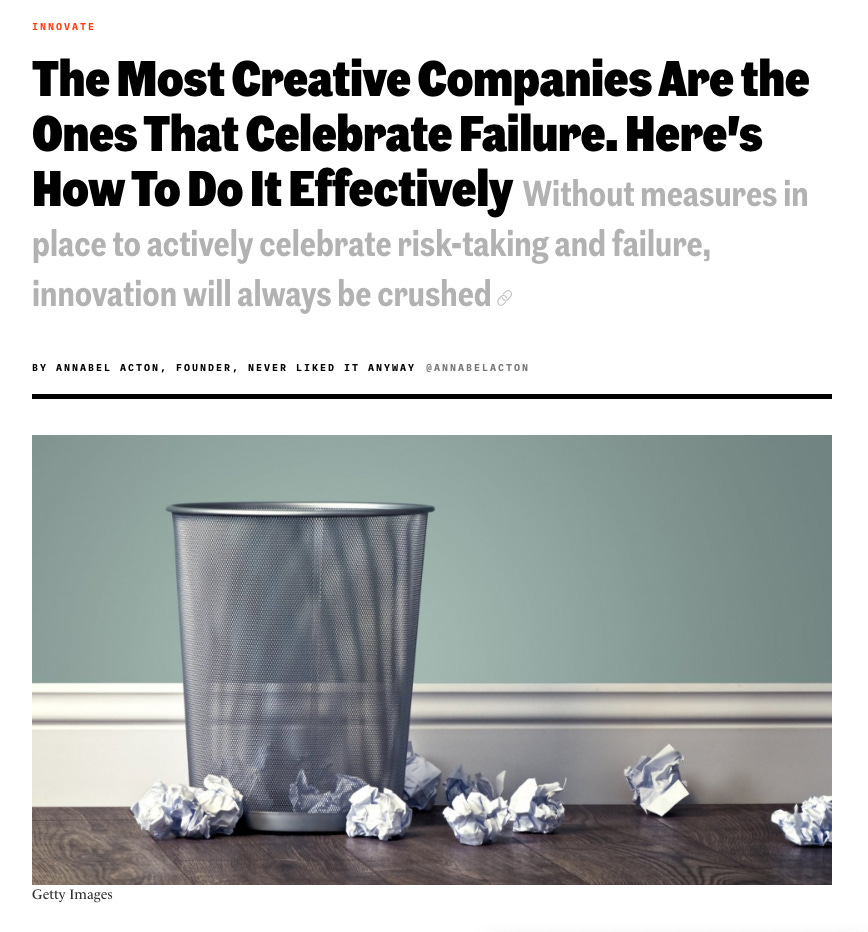Last weekend I watched Return To Space, the documentary about Elon Musk and SpaceX engineers embarking on a mission to return NASA astronauts to the International Space Station, and revolutionise space travel.
Whatever you think about Mr Musk, one thing that stood out to me was the approach he takes to failure:
“if things are not failing, you’re not innovating enough”.
This attitude towards experimentation is one that many inventors and entrepreneurs have to navigate, yet it flies in the face of what many of us believe deep inside; that failure is a bad thing.
Through innovative eyes, you learn more when you fail than you do when you succeed. The more you experiment, the more mistakes you make, the more you have the potential to learn.
The word ‘potential’ here is critical. Failing really is a failure if you don’t choose to learn from it. The key is to get better at failing faster and learning better.
The thing is, it takes courage to fail and admit to failing. Especially for leaders who have a perfectionist streak, who believe that things should be perfect first time round. Starting small and being brave is important.
There is no learning in the comfort zone and no comfort in the learning zone as the saying goes.
So let me ask you. How hard are you pushing yourself to fail?
Here are six thought provokers to get you thinking.
Contrast: Space X’s ‘learn through failure’ approach of designing, experimenting, failing and refining stands in stark contrast to Nasa’s focus on perfecting their model before putting it into practice.
You can see the contrast in day to day project management; where long term, predictive, planned based approaches (such as PRINCE2) sit alongside more experimental, incremental and short term approaches (of Agile).
How do your team naturally approach new initiatives?
Where are there opportunities to push harder for failure?
What do your team need from you to lead the charge?
Read: If like many others you share a perfectionist streak that holds you back from failure, read this about how ‘perfect’ is an illusion and what you can do to manage it.
Outcome v Process: Far too often we base success on the outcome, rather than the process, regardless of whether it was luck or circumstance that got us there.
One of my early managers told me it didn’t matter if something didn’t work out perfectly, as much as it did that I’d considered all the relevant factors and could explain clearly why I’d taken the route that I had in the situation.
It resulted in a lot less hang ups when something didn’t work out every time due to factors outside my control or simple misfortune.
How much do you focus on the outcome over your process?
What could a shift in mindset bring you?
Reflect: Last week I shared three simple questions to guide the reflection process and help you focus in on learning. The same questions can be used to learn from failure. Find them here:
Praise: For CEO of Roche Biotech Severin Schwan failure is key to success.
How much do you praise those around you for failing v succeeding?
What is cultural norm in your organisation?
What opportunities and what limitations does this bring?
Celebrate: Annabel Acton shares four helpful ways that companies can start celebrating failure in her piece for Inc here:
What is your collective leadership view about failure?
What impact does that have on your business strategy and your approach to new opportunities?
What could a one degree shift lead to?
You can find more thought provoking leadership thinking here and connect with me on Linkedin and Twitter.
Thanks for reading. You can subscribe below to receive new posts and support my work.










